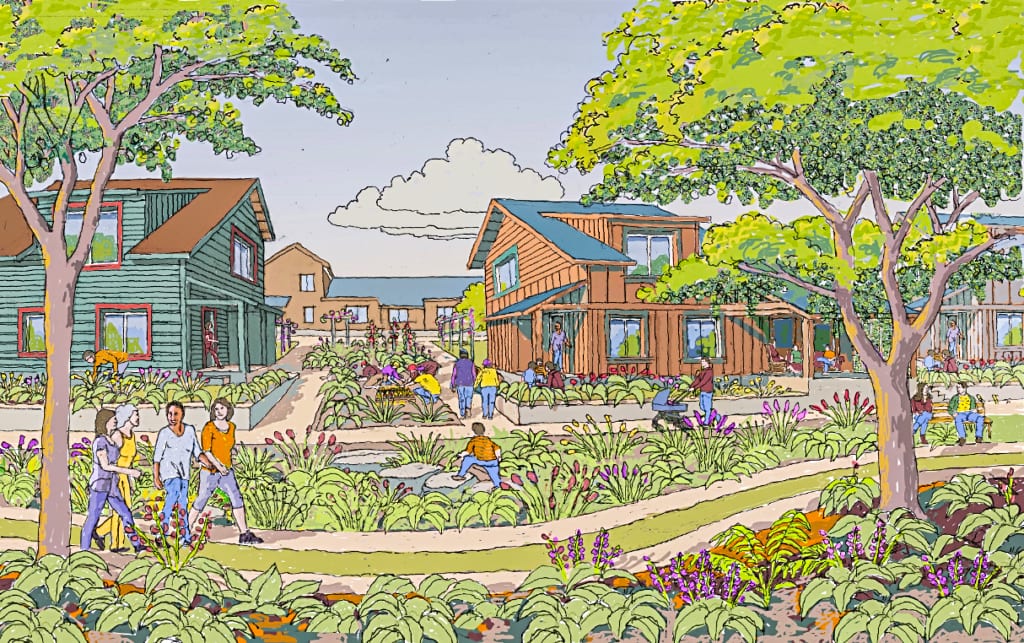
Rachel Carson EcoVillage to Become First Sustainable Cohousing Community in Western Pa.
by Amanda Waltz
December 22, 2020
Something is happening at the Eden Hall Campus, a farm-like branch of Chatham University that, among other things, houses the Falk School of Sustainability and Environment. Right now, a group of architects, engineers, and others are planning the Rachel Carson EcoVillage, a private community set to go up on a parcel of land owned by the university.
Chatham has worked with Pittsburgh Cohousing to create the EcoVillage, the first neighborhood of its kind in the region. Based on a practice that began in Denmark and has grown in the United States since around 1990, the concept is a close-knit community built on cooperation, sustainability, and contributing to the ecology and academic work of the surrounding campus.
“It's a commitment to being a good neighbor,” says Stefani Danes, an architect and adjunct professor at Carnegie Melon University who has researched cohousing as a member of Pittsburgh Cohousing, and serves as a consultant on the EcoVllage.
The planned project, named after Chatham's famed environmentalist alum, will include 35 housing units on the Eden Hall campus, a 400-acre property located 20 miles outside of Pittsburgh in Richland Township. But buying one of the units — expected to range in cost from $150,000 to $490,000 — isn't just investing in a property. It's investing in a lifestyle that focuses on sharing resources and other principles outlined by Kathryn McCamant and Charles Durrett's book “Cohousing: A Contemporary Approach to Housing Ourselves,” considered the impetus for the American cohousing movement.
For the last two decades, Danes says she had been looking for places to launch a Pittsburgh cohousing village, only to have one piece of property or another not work out. She was close to giving up when Chatham put out a request for proposals for such a project.
While the EcoVillage may seem like an experiment, Danes sees it as more resilient and long-lasting than people unfamiliar with the concept may assume. She says there are 150 other ecovillages located throughout the country, some of which have already been through a generation of owners.
“There isn't a single example of a community that, once it's built, hasn't survived and isn't doing well today,” said Danes, adding that, like with any neighborhood, owners move away and new people come in.
Despite it technically being a suburb, Danes says it operates in a way that, unlike other developments, alleviates stress on both the residents and the environment. This includes decreasing the amount of work commute-related pollution by implementing car-sharing and using a Chatham shuttle that travels into Pittsburgh. Neighbors also share and trade responsibilities, such as having one group do the grocery shopping for the entire village.
EcoVillage residents also have access to Eden Hall amenities, including a fitness center, on-site eateries, orchards and gardens, and activities, all of which contribute to the sense of community and less time spent traveling.
In addition, the units will be constructed to reduce the EcoVillage's overall carbon footprint. Danes explains that, while the village will be on the grid, the units will reflect the standards of passive house, a concept where homes use as little energy as possible to heat or cool the space. By doing this, Danes says that it will be less daunting to later incorporate renewal energy sources – for example, installing fewer solar panels than would otherwise be necessary. The end result would be to make the units net positive, meaning that they produce more energy than they consume.
Danes says they will also intend to design the units so they are more durable and easy to repair, and are built with sustainable materials produced without the use of toxic chemicals.
Guiding the project toward this goal is the sustainable architecture and consulting firm, evolvEA, and Fourth River Workers Guild, an ecological landscaping company Danes says will look at ways to better manage and improve the EcoVillage's stormwater.
The group is also working with researchers and professors at Eden Hall to figure out ways the EcoVillage can help the campus “regenerate a healthy ecosystem.”
“It's sitting on farmland that grew potatoes for generations and the soil is pretty bad,” says Danes. “That's something we've already started learning about and started organizing our site planning around. … Our goal is, in 50 years, we would have, instead of three inches of soil with very little organic matter, we would have 12 inches of really rich soil. And that's not what you would typically find in a housing program. … We are contributing in a positive way.”
Beyond the Eden Hall campus, she says they are also working with Rich Township leadership to ensure that the broader community understands and approves of the EcoVillage mission. This includes an online public hearing in January where residents can ask questions and express their concerns.
“We realize, because this is not conventional development, that we need to answer a lot of questions and make sure we're responding to what the folks around us care about,” says Danes.
So far, seven units have been pre-sold, and Danes expects more to sell before construction begins in 2022. Once started, the EcoVillage should take around 12 months to complete.
As for potential buyers, Danes says they hope to attract a wide range of people of different backgrounds, beliefs and age groups.
“There's no set of beliefs or anything like that,” says Danes. “It's just because you want to have a good neighborhood. The more different kinds of people, the better.”

Greatstory, we are your sister ecovillage across the state. What is the date and time of your open zoom meeting in october? i have the link but not the date. thanks, prospective member, dave blackmore, from altair ecovillage, kimberton, pa. daveyjane@yahoo.com